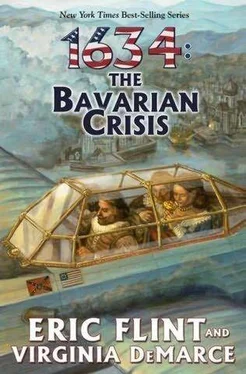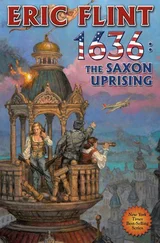Eric Flint - 1634 - The Bavarian Crisis
Здесь есть возможность читать онлайн «Eric Flint - 1634 - The Bavarian Crisis» весь текст электронной книги совершенно бесплатно (целиком полную версию без сокращений). В некоторых случаях можно слушать аудио, скачать через торрент в формате fb2 и присутствует краткое содержание. Жанр: Альтернативная история, на английском языке. Описание произведения, (предисловие) а так же отзывы посетителей доступны на портале библиотеки ЛибКат.
- Название:1634: The Bavarian Crisis
- Автор:
- Жанр:
- Год:неизвестен
- ISBN:нет данных
- Рейтинг книги:5 / 5. Голосов: 1
-
Избранное:Добавить в избранное
- Отзывы:
-
Ваша оценка:
- 100
- 1
- 2
- 3
- 4
- 5
1634: The Bavarian Crisis: краткое содержание, описание и аннотация
Предлагаем к чтению аннотацию, описание, краткое содержание или предисловие (зависит от того, что написал сам автор книги «1634: The Bavarian Crisis»). Если вы не нашли необходимую информацию о книге — напишите в комментариях, мы постараемся отыскать её.
1634: The Bavarian Crisis — читать онлайн бесплатно полную книгу (весь текст) целиком
Ниже представлен текст книги, разбитый по страницам. Система сохранения места последней прочитанной страницы, позволяет с удобством читать онлайн бесплатно книгу «1634: The Bavarian Crisis», без необходимости каждый раз заново искать на чём Вы остановились. Поставьте закладку, и сможете в любой момент перейти на страницу, на которой закончили чтение.
Интервал:
Закладка:
Throughout her afternoon eucharistic devotions before the reserved Host, the melody continued to replay itself in her head. Perhaps a bit guiltily, she assured herself that it was, after all, a hymn.
"I want to know," Maria Anna said firmly to Father Wilhelm Lamormaini, S.J., her father's confessor. "It is a reasonable question."
"How can you expect me to find out?"
"There are Jesuits in this Grantville. Write them. Ask them. Do these words in English, set to this music by Haydn, this Te Deum, mean that in those later days, England had been returned to the fold of the Church? And, if so, how? When? By whom? Through what means? And, if not, why was this man writing a Te Deum in English? Using Austrian music?"
Father Lamormaini looked at the archduchess rather cautiously. He understood the political motives that had caused the emperor to delay arranging marriages for his daughters. However…
Maria Anna was twenty-five years old. By this time, she should have long since been transferred from the authority of a father to that of a husband. She should have been too busy bearing and rearing babies to fret her mind about philosophical and political problems. But, having been permitted to reach adulthood and maturity while still unmarried, she was showing an unfortunate tendency to think for herself and to ask disconcerting questions.
Caution was unquestionably the best tactic.
"In this Grantville itself, as I understand it…" Father Lamormaini began.
"Yes?" The undertone was impatient.
So. Speed up the response somewhat. "The origins of this town were from the continent of North America. The settlers who came were from all parts of Europe, and were permitted to retain their faith upon settlement. The country became confessionally mixed, as in the case, for example, of the Imperial City of Augsburg. As we know, there are Catholics there…"
"Considering," interrupted Maria Anna with clear exasperation, "that their priest has been sent as head of the United States of Europe's delegation to Venice, I think we may presume that. Please answer my question. Had England, which is here in Europe, been returned to the Church?"
"To the best of my knowledge…" Father Lamormaini started again.
"Upon what is your knowledge based?"
"Reports."
"Thank you, Father." Maria Anna nodded. "Now, please, what do these reports say about England?"
"The entire country had not, as a unit, been returned to the fold of the Church. However, it had granted freedom of worship with no civil disabilities to Roman Catholics and had a fairly large number of citizens who belonged to the Church." Father Lamormaini's face expressed distaste for the next statement. "However, it was forbidden for the monarch to be Catholic."
"And in this America or United States? Was it also forbidden there for the president to be a Catholic?"
"Well, of course, their president was not properly a monarch. He was elected."
Maria Anna frowned. "What is wrong with that? My father was elected. God willing, my brother will be elected, and my nephew after him. So have all the Holy Roman Emperors been elected. So are bishops and abbots. And abbesses. So is the pope. Since God is omnipotent, He can certainly ensure that the electors follow his will when they make their choice."
Again, the Emperor's confessor found himself wishing Maria Anna had been married off at a much younger age. Wherever the archduchess's train of thought might be going-he could anticipate at least three possible goals-Father Lamormaini found it worrisome. Each of the possibilities he envisioned somehow managed to be more unnerving than the others, which was a remarkable logical achievement.
"Was it forbidden for this president to be a Catholic?" Maria Anna had not lost track of her original thought. As usual. In a way, Father Lamormaini was proud of her tutors. They had been Jesuits, of course.
"Ah, no. It was not forbidden," Father Lamormaini said uncomfortably. "It is my understanding that on one occasion a Catholic had been elected to that office. Once. Out of about forty men chosen over a span of almost two and a quarter centuries. In a country with a population that was almost one-quarter Catholic. Though it is only fair to say that at the level of the provinces, the 'states,' Catholics held a higher proportion of the offices."
By 1634, one of the proudest and most useful possessions of the Jesuit Order was a 1988 World Almanac and Book of Facts. Friedrich von Spee had found it in a box at a yard sale and sent it to Rome immediately.
"Was it forbidden, either in England or this America, for the Church to own property? To hold Corpus Christi and other public processions? To establish religious orders? To instruct children in schools?"
"The Church was permitted to carry on all those functions. Indeed, I understand, in America the constitution was written in such a way that it prohibited the civil administration from interfering in them."
"Do you have a copy of this document?"
Father Lamormaini did. However, he had no intention of corrupting the young archduchess' mind with it. "I am not in a position to provide you with a copy, Your Highness."
Maria Anna appreciated the diplomatic wording of his answer. She'd really just been probing Father Lamormaini, as she often did, to discover the limits she would be officially permitted. As it happened, she already had a copy. In fact, she had read it many times. She wondered if Father Lamormaini realized just how many copies were available in the world as it now was in the year 1634. It seemed like half the presses in Europe were printing them by the thousands. Sometimes spiritual advisors, even Jesuits, were just so… unworldly.
She reminded herself, as firmly as possible, that that was after all their job. To draw people to God, especially those in positions of power. At least, that was what they were supposed to be for.
So, her reply was also carefully worded. "I will not press you to get one for me."
She paused. "I do have another question, though. Father Lamormaini, I know that you were one of Papa's advisors who most strongly supported having him issue the Edict of Restitution four years ago. True, this defended the rights of the Church to its temporal goods, to its worldly property. But by demanding that the princes of Germany restore all of the… things…"
She waved her hand expressively at the top of the table at which they were seated, its golden and bejeweled crucifix, its mother-of-pearl-inlaid box of writing materials, its globe of the world. "By demanding restoration of all of the real estate-which is a form of material things-that the German princes confiscated during the Reformation, back to the way things were in the year 1552, some say that it really caused the intervention of the King of Sweden. He would scarcely have come to defend the free exercise of religion by the Calvinists and sectarians, I should think. The Lutherans like them little more than the Holy Church does. It was the provisions in regard to material things that really, some people say, restarted a war that otherwise might have ended on endurable terms."
She picked up a piece of paper and wrote a line on it: What does it profit a man, if he gains the world and loses his soul?
She handed it to him. "Is it more important that the Church regain all the temporal worldly goods that she once held? Or that she be free to practice her faith unhindered in Protestant territories? If these were placed before a Catholic ruler as a choice, which way should he go?"
Father Lamormaini swallowed. "I am not your confessor," he pointed out.
"I'm not asking you to provide me with guidance, Father," Maria Anna answered impatiently. "I'm just asking a simple question. A question for people who live in a world where you can't have exactly what you want-not all of the time; not even most of the time. That's just as true for emperors and archduchesses as it is for shopkeepers and peasants. So. Which one is more important?"
Читать дальшеИнтервал:
Закладка:
Похожие книги на «1634: The Bavarian Crisis»
Представляем Вашему вниманию похожие книги на «1634: The Bavarian Crisis» списком для выбора. Мы отобрали схожую по названию и смыслу литературу в надежде предоставить читателям больше вариантов отыскать новые, интересные, ещё непрочитанные произведения.
Обсуждение, отзывы о книге «1634: The Bavarian Crisis» и просто собственные мнения читателей. Оставьте ваши комментарии, напишите, что Вы думаете о произведении, его смысле или главных героях. Укажите что конкретно понравилось, а что нет, и почему Вы так считаете.











